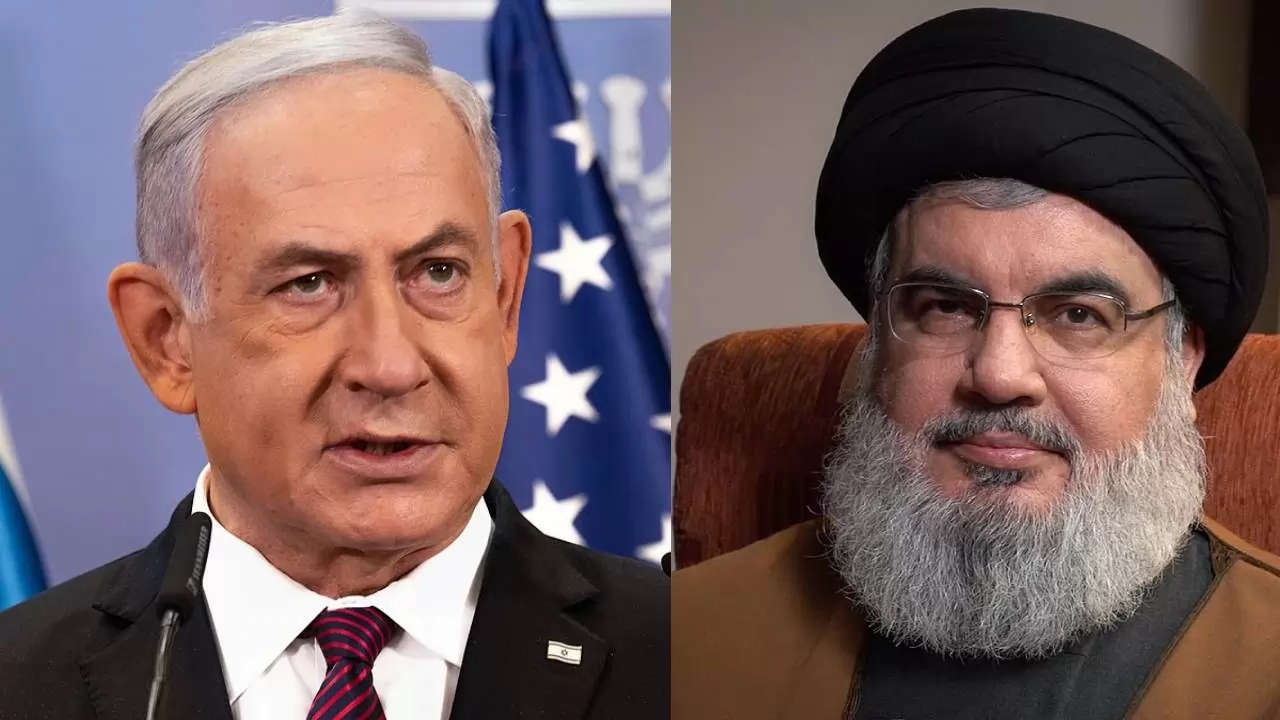
Nasrallah, Netanyahu (Wikipedia)
Washington: US officials are expecting a significant rise in hostilities between Israel and Hezbollah, with some predicting that the conflict could spiral into a full-blown war. While there remains hope that diplomacy can ease the tensions, many within the Biden administration are skeptical that a peaceful resolution is still possible.
American officials have long stated that both Israel and Hezbollah aim to avoid a major conflict. However, recent developments, including a series of Israeli strikes on Hezbollah targets in Lebanon, have pushed tensions to unprecedented levels. The latest analysis from senior US officials indicates that it may be increasingly difficult for either side to step back from the brink, despite ongoing diplomatic efforts.
These concerns have grown following Israeli actions this week, including the destruction of Hezbollah communications devices and the bombing of a residential building in Beirut, which reportedly killed top Hezbollah commander Ibrahim Aqil. These strikes are viewed as part of a broader Israeli campaign aimed at weakening Hezbollah’s military capabilities in southern Lebanon.
Despite the intensifying violence, US officials are working closely with regional allies and Israel to prevent a direct confrontation between the two sides. However, there is a clear divergence between the administration’s public statements and private assessments. National Security Council spokesperson John Kirby reiterated the official stance: “We still believe there is time and space for a diplomatic solution. War is not inevitable, and we’re going to continue to do everything we can to try to prevent it.”
Yet, behind the scenes, US officials acknowledge that Israel is determined to use military pressure to force Hezbollah into negotiations, hoping to resolve the conflict on Israel’s northern border. This would pave the way for the return of Israelis who have been displaced by the fighting.
One US official familiar with the situation said that more attacks in Lebanon, particularly in Beirut, are anticipated. In retaliation, Hezbollah is expected to launch drone strikes against Israeli targets. There is also a growing likelihood of further targeted assassinations of Hezbollah leaders and attacks on Hezbollah arms depots and communication systems.
While the tit-for-tat attacks have not yet triggered a full-scale confrontation along Israel’s northern border, the situation is volatile. “Both sides think they can increase the tempo of attacks while keeping it below the threshold of a full-scale war,” said Firas Maksad of the Middle East Institute. “But at this point, nothing is guaranteed.”
The Biden administration’s greatest fear is that this conflict could escalate into a regional war, potentially involving the United States. In an effort to prevent such a scenario, US officials have been closely monitoring speeches by Hezbollah leader Hassan Nasrallah. His recent comments, describing Israel’s latest actions as a “declaration of war,” have been particularly concerning.
“The enemy has crossed all red lines,” Nasrallah declared, signaling Hezbollah’s readiness for further escalation.
Israeli officials, on the other hand, have made it clear that they have entered a new phase of military operations. Defense Minister Yoav Gallant stated in a video released on X (formerly Twitter) that “the sequence of military actions will continue.”
US officials are still assessing how this volatile situation will evolve in the coming days. Despite diplomatic efforts over the past year to keep the conflict from escalating, the current hostilities seem to be pushing the limits of diplomacy.
Israel, while aware of Washington’s desire for de-escalation, is determined to act against Hezbollah, which it views as a proxy of Iran. A source familiar with Israel’s stance said, “Israel is not going to wait to take action against Hezbollah, despite US pleas to hold off.”
The heightened conflict between Israel and Hezbollah is also stalling ceasefire negotiations in Gaza. With neither Israel nor Hamas willing to compromise on ceasefire terms, the chances of moving forward on a deal are diminishing. Hezbollah has made it clear that they will only agree to reduce hostilities if a ceasefire in Gaza is achieved.
Asked by a reporter about the chances of achieving a ceasefire, President Joe Biden remained hopeful: “If I ever say it’s not realistic, then I might as well leave. A lot of things don’t look realistic until we get them done. We have to keep at it.”
The situation remains fluid, with US officials continuing to push for diplomacy, even as the threat of a broader regional war looms.





Copyright © 2026 Top Indian News
